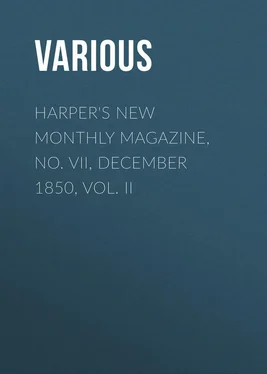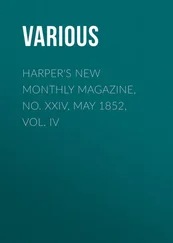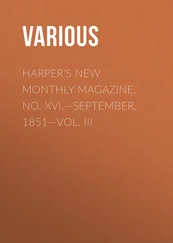Various - Harper's New Monthly Magazine, No. VII, December 1850, Vol. II
Здесь есть возможность читать онлайн «Various - Harper's New Monthly Magazine, No. VII, December 1850, Vol. II» — ознакомительный отрывок электронной книги совершенно бесплатно, а после прочтения отрывка купить полную версию. В некоторых случаях можно слушать аудио, скачать через торрент в формате fb2 и присутствует краткое содержание. Издательство: Иностранный паблик, Жанр: periodic, foreign_edu, на английском языке. Описание произведения, (предисловие) а так же отзывы посетителей доступны на портале библиотеки ЛибКат.
- Название:Harper's New Monthly Magazine, No. VII, December 1850, Vol. II
- Автор:
- Издательство:Иностранный паблик
- Жанр:
- Год:неизвестен
- ISBN:нет данных
- Рейтинг книги:4 / 5. Голосов: 1
-
Избранное:Добавить в избранное
- Отзывы:
-
Ваша оценка:
- 80
- 1
- 2
- 3
- 4
- 5
Harper's New Monthly Magazine, No. VII, December 1850, Vol. II: краткое содержание, описание и аннотация
Предлагаем к чтению аннотацию, описание, краткое содержание или предисловие (зависит от того, что написал сам автор книги «Harper's New Monthly Magazine, No. VII, December 1850, Vol. II»). Если вы не нашли необходимую информацию о книге — напишите в комментариях, мы постараемся отыскать её.
Harper's New Monthly Magazine, No. VII, December 1850, Vol. II — читать онлайн ознакомительный отрывок
Ниже представлен текст книги, разбитый по страницам. Система сохранения места последней прочитанной страницы, позволяет с удобством читать онлайн бесплатно книгу «Harper's New Monthly Magazine, No. VII, December 1850, Vol. II», без необходимости каждый раз заново искать на чём Вы остановились. Поставьте закладку, и сможете в любой момент перейти на страницу, на которой закончили чтение.
Интервал:
Закладка:
Indeed letter-publishing seems to have been quite the rage in the eighteenth century. The Secretary La Beaumelle stole all Madame de Maintenon's letters to her brother, setting forth her difficulties in humoring Louis XIV., and printed them at Copenhagen. Some copies were obligingly forwarded to Versailles, but madame assured the king they were beneath his royal notice, which, being confirmed by his confessor, was of course believed; but the transaction looks like retributive justice on her well-known practice of keeping sundry post-office clerks in pay to furnish a copy of every letter sent or received by the principal persons at court, not excepting even the royal family. Among these were copied the celebrated letters of the Dauphiness Charlotte Elizabeth of Bavaria, which now, in good plain print, present to all readers of taste in that department a complete chronicle of all the scandal, gossip, and follies of Versailles; and that princess, whose pride stood so high on her family quarterings, was gravely rebuked, and obliged to ask pardon seven years after for certain uncomplimentary passages in her epistles regarding madame when she first came to court as nursery governess to the king's children.
Dangerous approvers have old letters been from throne to cottage. Many a specious statement, many a fair profession, ay, and many a promising friendship, have they shaken down. Readers, have a care of your deposits in the post-office; they are pledges given to time. It is strange, though true, how few historical characters are benefited by the publication of their letters, surviving, as such things do, contemporary interests and prejudices, as well as personal influence.
There must be something of the salt that will not lose its savor there to make them serve the writers in the eyes of posterity. What strange confidence the age of hoop and periwig put in letter-writing! Divines published their volumes of controversy or pious exhortation, made up of epistles to imaginary friends. Mrs. Chapone's letters to her niece nourished the wisdom of British belles; while Lord Chesterfield's to his son were the glass of fashion for their brothers; and Madame de Sévigné's to her daughter, written expressly for publication, afforded models for the wit, elegance, and sentiment of every circle wherein her language was spoken. The epistolary style's inherent power of characterization naturally recommended it in the construction of their novels, and many a tale of fame and fashion in its day, besides "La Nouvelle Heloise," and "Sir Charles Grandison," was ingeniously composed of presumed correspondence.
Chinese literature is said to possess numerous fictions in that form; but it is not to be regretted that modern novelists, whose name is more than legion, pass it by in favor of direct narrative; for, under the best arrangement, a number of letters can give but a series of views, telling the principals' tale in a broken, sketchy fashion, and leaving little room for the fortunes of second-rate people, who are not always the lowest company in the novel. Tours and travels tell pleasantly in letters, supposing of course the letters to be well written; for some minds have such a wondrous affinity for the commonplace, that the most important event or exciting scene sinks to the every-day level under their pen.
Sir Andrew Mitchell, who was British embassador to Prussia during the seven years' war, writes from the camp before Prague concerning that great battle which turned the scale of power in Germany, and served Europe to talk of till the French Revolution, in a style, but for quotations from the bulletin, suitable to the election of some civic alderman; and a less known traveler, writing to a friend of the glare of Moscow's burning, which he saw from a Russian country-house, reddening the northern night, describes it as "a very impressive circumstance, calculated to make one guard against fire."
It has been remarked that, as a general rule, poets write the best, and schoolmasters the worst letters. That the former, in common with literary men of any order, should be at least interesting correspondents, seems probable; but why the instructors of youth should be generally stricken with deficiency in letter-writing is not so easy of explanation.
Some one has also observed that, independent of mental gifts and graces, characters somewhat cold and frivolous generally write the most finished letters, and instanced Horace Walpole, whose published epistles even in our distant day command a degree of attention never to be claimed by those of his superior contemporaries – the highly-gifted Burke, and the profound Johnson. It may be that the court gossip in and upon which Horace lived has done much for the letters from Strawberry Hill, but the vein must have been there; and the abilities that shine in the world of action or of letters, the conversational talents or worthiness of soul, do not make the cleverest correspondent.
Count Stadion, prime minister to the Elector of Mayence, according to Goethe, hit on an easy method of making an impression by letters. He obliged his secretary, Laroche, to practice his handwriting, which, it appears, he did with considerable success; and, says the poet in his own memoirs, being "passionately attached to a lady of rank and talent, if he stopped in her society till late at night, his secretary was, in the mean time, sitting at home, and hammering out the most ardent love-letters; the count chose one of these, and sent it that very night to his beloved, who was thus necessarily convinced of the inextinguishable fire of her passionate adorer."
"Hélas!" as Madame d'Epigny remarked, when turning over the printed epistles of a deceased friend, "one can never guess how little truth the post brings one;" but from the following tradition, it would seem the less the better. Among the old-world stories of Germany are many regarding a fairy chief or king, known from rustic times as Number Nip, or Count-the-Turnips. One of his pranks was played in an ancient inn of Heidelberg, where, on a December night, he mixed the wine with a certain essence distilled from the flowers of Elfland, which had the effect of making all who tasted it tell nothing but truth with either tongue or pen till the morning. The series of quarrels which took place in consequence round the kitchen fire belong not to the present subject; but in the red parlor there sat, all from Vienna, a poet, a student, a merchant, and a priest. After supper, each of these remembered that he had a letter to write – the poet to his mistress, the merchant to his wife, the priest to the bishop of his diocese, and the student to his bachelor uncle, Herr Weisser of Leopoldstadt, who had long declared him his heir. Somehow next morning they were all at the post-office beseeching their letters back; but the mail had been dispatched, and the tale records how, after that evening's correspondence, the poet's liege lady dismissed him, the merchant and his wife were divorced, the priest never obtained preferment, and none of the letters were answered except the student's, whom Herr Weisser complimented on having turned out such a prudent, sensible young man, but hoped he wouldn't feel disappointed, as himself intended to marry immediately.
The most curiously-characteristic letters now made public property are those of Sir Walter Raleigh to Queen Elizabeth, written from the Tower (to which the historian of the world was committed for wedding without her majesty's permission), and in the highest tone of desperation that a banished lover could assume; the correspondence between Frederick of Prussia and Voltaire, then of France, after what was called their reconciliation, beginning with the grandest compliments, and ending with reminiscences of quite another kind, particularly that from the royal pen, which opens with, "You, who from the heights of philosophy look down on the weakness and follies of mankind," and concludes with the charge of appropriating candle-ends; and the epistles of Rousseau during his residence in England, which alternate between discoveries of black conspiracies against his life and fame, and threats of adjournment to the workhouse, if his friends would not assist him to live in a better style than most country gentlemen of the period.
Читать дальшеИнтервал:
Закладка:
Похожие книги на «Harper's New Monthly Magazine, No. VII, December 1850, Vol. II»
Представляем Вашему вниманию похожие книги на «Harper's New Monthly Magazine, No. VII, December 1850, Vol. II» списком для выбора. Мы отобрали схожую по названию и смыслу литературу в надежде предоставить читателям больше вариантов отыскать новые, интересные, ещё непрочитанные произведения.
Обсуждение, отзывы о книге «Harper's New Monthly Magazine, No. VII, December 1850, Vol. II» и просто собственные мнения читателей. Оставьте ваши комментарии, напишите, что Вы думаете о произведении, его смысле или главных героях. Укажите что конкретно понравилось, а что нет, и почему Вы так считаете.












